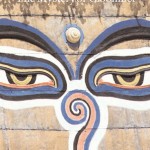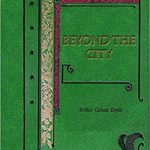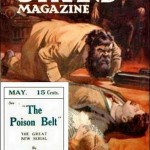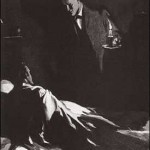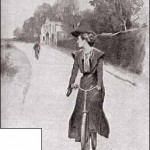
The place was the Eastbourne-Tunbridge road, not very far from the Cross in Hand—a lonely stretch, with a heath running upon either side. The time was half-past eleven upon a Sunday night in the late summer. A motor was passing slowly down the road.
It was a long, lean Rolls-Royce, running smoothly with a gentle purring of the engine. Through the two vivid circles cast by the electric head-lights the waving grass fringes and clumps of heather streamed swiftly like some golden cinematograph, leaving a blacker darkness behind and around them. One ruby-red spot shone upon the road, but no number-plate was visible within the dim ruddy halo of the tail-lamp which cast it. The car was open and of a tourist type, but even in that obscure light, for the night was moonless, an observer could hardly fail to have noticed a curious indefiniteness in its lines. As it slid into and across the broad stream of light from an open cottage door the reason could be seen. The body was hung with a singular loose arrangement of brown holland. Even the long black bonnet was banded with some close-drawn drapery.
The solitary man who drove this curious car was broad and burly. He sat hunched up over his steering-wheel, with the brim of a Tyrolean hat drawn down over his eyes. The red end of a cigarette smouldered under the black shadow thrown by the headgear. A dark ulster of some frieze-like material was turned up in the collar until it covered his ears. His neck was pushed forward from his rounded shoulders, and he seemed, as the car now slid noiselessly down the long sloping road, with the clutch disengaged and the engine running free, to be peering ahead of him through the darkness in search of some eagerly-expected object.
The distant toot of a motor-horn came faintly from some point far to the south of him. On such a night, at such a place, all traffic must be from south to north when the current of London week-enders sweeps back from the watering-place to the capital—from pleasure to duty. The man sat straight and listened intently. Yes, there it was again, and certainly to the south of him. His face was over the wheel and his eyes strained through the darkness. Then suddenly he spat out his cigarette and gave a sharp intake of the breath. Far away down the road two little yellow points had rounded a curve. They vanished into a dip, shot upwards once more, and then vanished again. The inert man in the draped car woke suddenly into intense life. From his pocket he pulled a mask of dark cloth, which he fastened securely across his face, adjusting it carefully that his sight might be unimpeded. For an instant he uncovered an acetylene hand-lantern, took a hasty glance at his own preparations, and laid it beside a Mauser pistol upon the seat alongside him. Then, twitching his hat down lower than ever, he released his clutch and slid downward his gear-lever. With a chuckle and shudder the long, black machine sprang forward, and shot with a soft sigh from her powerful engines down the sloping gradient. The driver stooped and switched off his electric head-lights. Only a dim grey swathe cut through the black heath indicated the line of his road. From in front there came presently a confused puffing and rattling and clanging as the oncoming car breasted the slope. It coughed and spluttered on a powerful, old-fashioned low gear, while its engine throbbed like a weary heart. The yellow, glaring lights dipped for the last time into a switchback curve. When they reappeared over the crest the two cars were within thirty yards of each other. The dark one darted across the road and barred the other’s passage, while a warning acetylene lamp was waved in the air. With a jarring of brakes the noisy new-comer was brought to a halt.
“I say,” cried an aggrieved voice, “‘pon my soul, you know, we might have had an accident. Why the devil don’t you keep your head-lights on? I never saw you till I nearly burst my radiators on you!”
The acetylene lamp, held forward, discovered a very angry young man, blue-eyed, yellow-moustached, and florid, sitting alone at the wheel of an antiquated twelve-horse Wolseley. Suddenly the aggrieved look upon his flushed face changed to one of absolute bewilderment. The driver in the dark car had sprung out of the seat, a black, long-barrelled, wicked-looking pistol was poked in the traveller’s face, and behind the further sights of it was a circle of black cloth with two deadly eyes looking from as many slits.
“Hands up!” said a quick, stern voice. “Hands up! or, by the Lord——”
The young man was as brave as his neighbours, but the hands went up all the same.
“Get down!” said his assailant, curtly.
The young man stepped forth into the road, followed closely by the covering lantern and pistol. Once he made as if he would drop his hands, but a short, stern word jerked them up again.
“I say, look here, this is rather out o’ date, ain’t it?” said the traveller. “I expect you’re joking—what?”
“Your watch,” said the man behind the Mauser pistol.
“You can’t really mean it!”
“Your watch, I say!”
“Well, take it, if you must. It’s only plated, anyhow. You’re two centuries out in time, or a few thousand miles longitude. The bush is your mark—or America. You don’t seem in the picture on a Sussex road.”
“Purse,” said the man. There was something very compelling in his voice and methods. The purse was handed over.
“Any rings?”
“Don’t wear ’em.”
“Stand there! Don’t move!”
The highwayman passed his victim and threw open the bonnet of the Wolseley. His hand, with a pair of steel pliers, was thrust deep into the works. There was the snap of a parting wire.
“Hang it all, don’t crock my car!” cried the traveller.
He turned, but quick as a flash the pistol was at his head once more. And yet even in that flash, whilst the robber whisked round from the broken circuit, something had caught the young man’s eye which made him gasp and start. He opened his mouth as if about to shout some words. Then with an evident effort he restrained himself.
“Get in,” said the highwayman.
The traveller climbed back to his seat.
“What is your name?”
“Ronald Barker. What’s yours?”
The masked man ignored the impertinence.
“Where do you live?” he asked.
“My cards are in my purse. Take one.”
The highwayman sprang into his car, the engine of which had hissed and whispered in gentle accompaniment to the interview. With a clash he threw back his side-brake, flung in his gears, twirled the wheel hard round, and cleared the motionless Wolseley. A minute later he was gliding swiftly, with all his lights gleaming, some half-mile southward on the road, while Mr. Ronald Barker, a side-lamp in his hand, was rummaging furiously among the odds and ends of his repair-box for a strand of wire which would connect up his electricity and set him on his way once more.
When he had placed a safe distance between himself and his victim, the adventurer eased up, took his booty from his pocket, replaced the watch, opened the purse, and counted out the money. Seven shillings constituted the miserable spoil. The poor result of his efforts seemed to amuse rather than annoy him, for he chuckled as he held the two half-crowns and the florin in the glare of his lantern. Then suddenly his manner changed. He thrust the thin purse back into his pocket, released his brake, and shot onwards with the same tense bearing with which he had started upon his adventure. The lights of another car were coming down the road.


